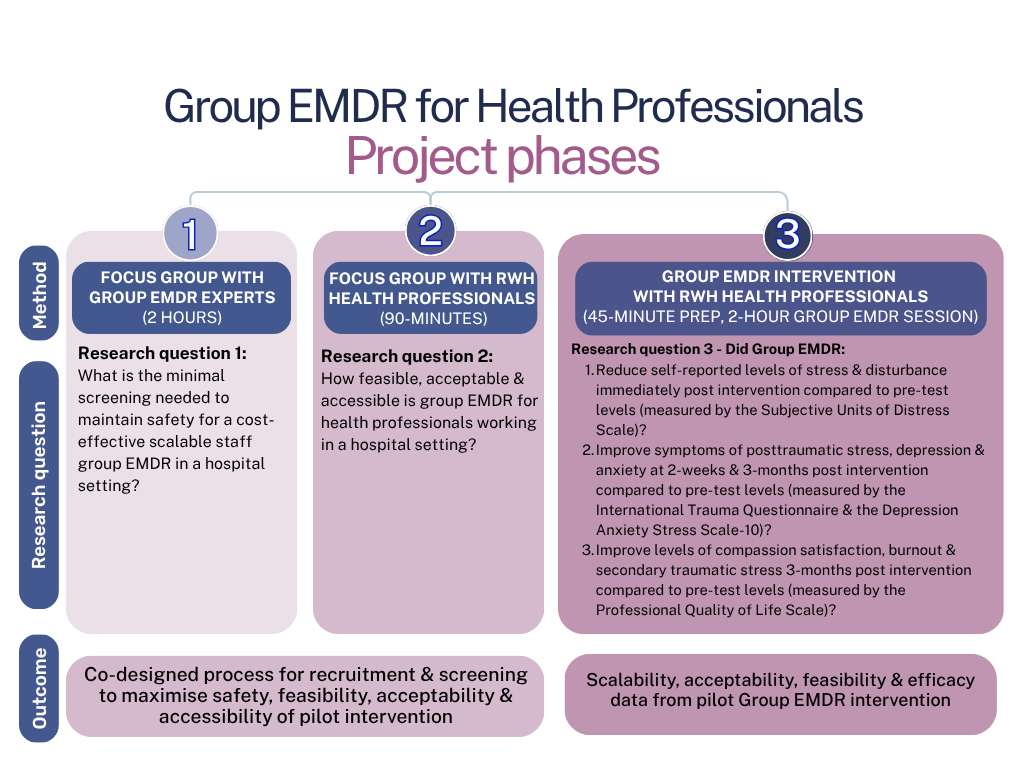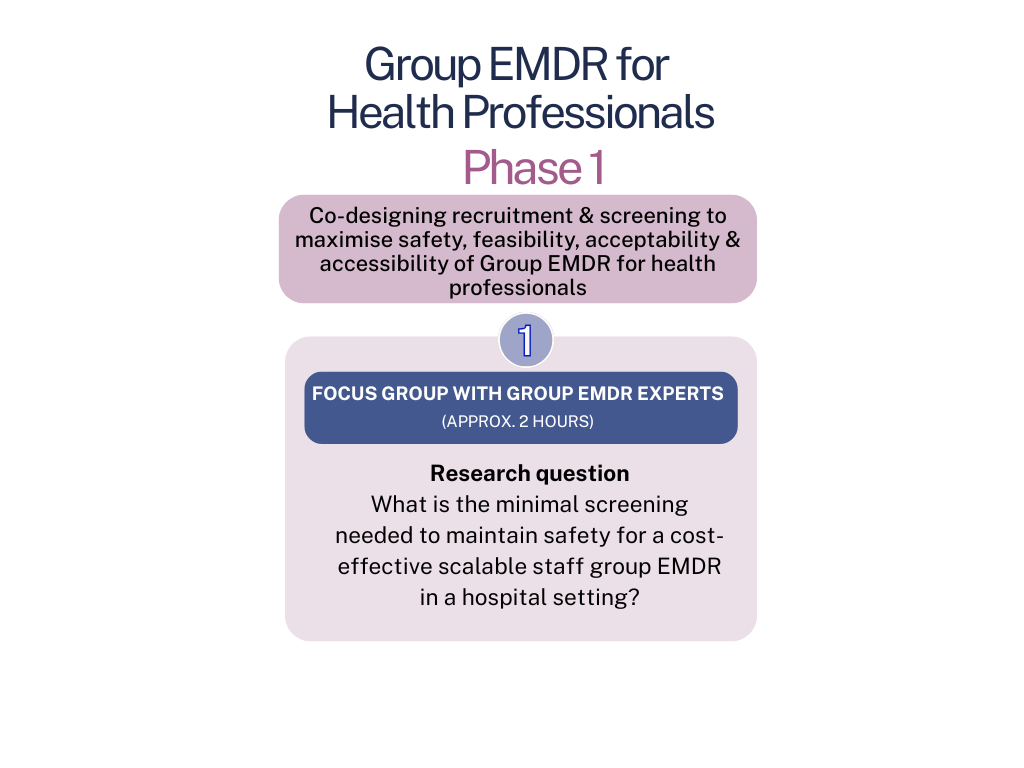Group EMDR for Health Professionals
A vicarious trauma and burnout prevention approach
The aim of the project titled ‘Group EMDR for Health Professionals’ study is to effectively support health professionals exposed to distressing events, trauma and burnout at work. In this pilot study, we are testing a brief psychological group treatment called Group Eye Movement Desensitization Reprocessing Therapy (EMDR) with health professionals at the Royal Women’s Hospital, Victoria (RWH).
This is a three-phased study to further the knowledge and capacity of healthcare workplaces to better support and retain their clinical workforce.
This study has three aims:
The aim of Phase 1 is to co-design with international EMDR experts the screening and preparation phase of a pilot Group EMDR intervention.
The aim of Phase 2 is to co-design with health professionals in a hospital setting the recruitment, screening and implementation of the pilot Group EMDR intervention.
The aim of Phase 3 is to evaluate the scalability, acceptability, feasibility and efficacy of the pilot Group EMDR intervention at RWH.
Phase 1 – Talking to Group EMDR experts
Group EMDR was first developed as an early intervention to upscale delivery. Since then, it has been used with a range of presenting problems and length of time between the trauma episode and group intervention. While mounting evidence suggests that Group EMDR is safe and effective for most people, it is not recommended for those who are unable to regulate high levels of distress or disturbance. A method to ensure effective screening for Group EMDR is therefore essential. However, the current protocol of clinician-provided screening presents significant cost and time barriers to widespread implementation of Group EMDR in large healthcare workplaces. We want to explore the possibility of health professionals drawing upon their existing clinical skills to effectively and safely step through a self-directed screening process.
What are some of the questions that will be asked in the Phase 1 focus group?
Please share your experiences about screening and preparation for Group EMDR with health professionals
Are there any considerations about the length of time or nature of the trauma episode that should inform screening?
Please share any experiences you have had with self-directed screening into Group EMDR
What are your views about the minimal screening needed to maintain safety for a cost-effective scalable group EMDR intervention for staff in a hospital setting
What needs to be considered in relation to a stepped, self-directed screening process for health professionals into Group EMDR in a hospital setting?
What concerns do you have about a stepped, self-directed screening process for health professionals into Group EMDR in a hospital setting?
When the group setting is also a place of employment, are there any additional considerations that should be given to screening and informed consent processes?
What will I be asked to do?
International providers and researchers of Group EMDR are invited to attend a two-hour focus group to share their views about the minimal screening needed to safely provide a cost-effective, scalable group intervention in a hospital setting. The discussions will be held online via Zoom at a time that suits most people. The group will be facilitated by Jenny Dwyer and Elizabeth McLindon.
Why take part?
Your participation will inform the preparation and screening processes for Phases 2 and 3 of this Group EMDR study about a feasible, acceptable, accessible and effective Group EMDR intervention with health professionals working at the Royal Women’s Hospital. There may be other benefits that are of less direct benefit to you. For example, by participating in a new initiative and sharing information about your experience with us, you may help Group EMDR become more accessible in healthcare workplaces broadly.
The Researchers
Dr Elizabeth McLindon
Liz is the deputy Director of the Women's Centre for Family Violence Prevention, a Research Fellow in the RESTORE Centre for Research Excellence at the University of Melbourne and a senior sexual assault Counsellor/Advocate at the Women’s CASA House. Liz is an accredited EMDR practitioner (individual and group EMDR). In her research, Liz is committed to finding innovative and sustainable ways of supporting health professionals who have experienced primary or secondary (vicarious) trauma.
Prof Kelsey Hegarty
Kelsey Hegarty is an academic general practitioner who holds the joint Chair in Family Violence Prevention at the University of Melbourne and the Royal Women's Hospital. She leads a Centre of Research Excellence to promote Safer Families, and she co-chairs the Melbourne Research Alliance to End Violence against Women (MAEVe). Her research includes interventions to prevent violence against women through early identification and response to family violence in health care settings. Kelsey provides regular expert advice to the World Health Organsiation.
Dr Jenny Dwyer
Jenny is a child and family therapist and an Accredited EMDR trainer in Australia. She trained in Group EMDR with the founder of G-TEP, Elan Shapiro, and is an R-TEP and G-TEP trainer. Jenny founded EMDR Academy Australia as a way of building capacity, supporting practitioners and expanding the reach of EMDR. She has developed EMDR Early Intervention programs for organisations, and contributed to published research and evaluations of these interventions. She has had a long-standing interest in systemic responses to trauma, and has developed practice frameworks for government and organisations in youth justice, family violence and child protection.
Ms Amanda Morris
Amanda is the Senior Program Manager - Family Violence at the Royal Women’s Hospital. Based in the Social Model of Health Division, Amanda’s role is to strengthen the capacity of the Women’s and all tertiary Victorian Hospitals’ capacity to identify and respond to women and their children experiencing or at risk of family, domestic and sexual violence. Amanda has worked on several recent research project collaborations between RWH and University of Melbourne and her background is in Sociology and Social Service Work.
FAQs
-
You can find the Plain Language Statement and Consent document here.
-
You can provide your consent through this link here.
-
No. Taking part is voluntary. You can withdraw from the study at any time. Even if you sign the consent form, you can withdraw from the project at any time. If you ask us to, we can also remove the information you have shared with us from our records up until the time we start analysing the results of the study. There will be no negative impacts if you choose not to take part or if you withdraw.
If you need support when you are not in the group, please consider contacting one of the following:
· Sexual Assault Crisis Line, Ph. 1800 806 292 https://www.sacl.com.au/ | https://www.casahouse.com.au/
· The National 24-hour domestic family and sexual violence counselling service ‘1800 Respect’ on Ph: 1800 737 732
-
Yes. All information will be kept securely at the Women’s for a minimum of five years and destroyed five years after public release of research or last publication per Hospital guidelines. We take your privacy seriously. The information you share with us will be used for research purposes only and will not be shared for any other reason. All information you share with us will be deidentified, password protected and accessible only by the researchers on this project after your focus group.
-
Yes. When the project is finished, we will give you a summary of the final report.
-
This research project has been approved by the Human Research Ethics Committee at the Women’s Hospital [Ethics ID 112139].
-
This Project is funded by The Centre for Family Violence Prevention who receives its funding via philanthropy.
-
DASS-10 | Depression Anxiety Stress Scale-10 (Halford & Frost, 2021)
EMDR | Eye Movement Desensitization and Reprocessing Therapy (Shapiro, 1995, 2018)
Group EMDR | Group Eye Movement Desensitization Reprocessing Therapy
G-TEP | Group Eye Movement Desensitization and Reprocessing Therapy is the name of the Group EMDR protocol developed by Elan Shapiro (2013, 2017)
ITQ | International Trauma Questionnaire (Cloitre et al., 2018)
ProQOL | Professional Quality of Life Scale (Stamm, 1995)
RWH | The Royal Women’s Hospital
SUD | Subjective Units of Distress. SUD is a scale of 0 to 10, measuring the subjective intensity of disturbance or distress currently experienced by an individual (Wolpe, 1969)








